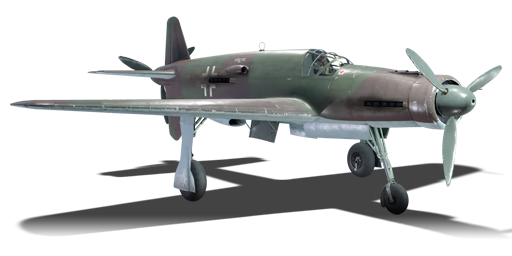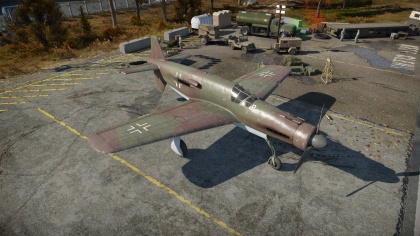Do 335 A-0
Contents
| This page is about the German twin-engine fighter Do 335 A-0. For other uses, see Do 335 (Family). |
Description
The Do 335 A-0 is a rank III German twin-engine fighter
with a battle rating of 4.3 (AB), 4.7 (RB), and 5.0 (SB). This fighter was introduced in Update 1.57 "Battle March". This pre-production run does not feature payload options, unlike the A-1 series. Fortunately, this difference is favourable for the A-0 as it features superior aerodynamics and henceforth better top speed, despite only running on the 50PS weaker DB603A (PS = metric horsepower).
Contrary to popular belief, the Do 335 "Pfeil" is not a "super prop". The initial design was a "Schnellbomber" (speedy bomber), but with the start of the emergency fighter program, most bomber contracts were shelved to increase fighter production. At Dornier, the idea arose to reconfigure the current bomber design into a heavy fighter to exploit the failure of Focke Wulf's Ta 154 "Moskito".
Consequently, flight agility is mediocre, lending itself in feeling to Dornier's previous heavy fighters: Do 17 Z-7 and Do 217N, both of which were also originally designed as bombers. The exception to this trait is the fantastic roll rate, accomplished by boosted ailerons as seen on the Ta 152 H-1.
General info
Flight Performance
Describe how the aircraft behaves in the air. Speed, manoeuvrability, acceleration and allowable loads - these are the most important characteristics of the vehicle.
| Characteristics | |||||||
|---|---|---|---|---|---|---|---|
| Stock | |||||||
| Max Speed (km/h at 6,500 m) |
Max altitude (meters) |
Turn time (seconds) |
Rate of climb (meters/second) |
Take-off run (meters) | |||
| AB | RB | AB | RB | AB | RB | ||
| 748 | 726 | 11400 | 28.3 | 29.4 | 8.3 | 8.3 | 500 |
| Upgraded | |||||||
| Max Speed (km/h at 6,500 m) |
Max altitude (meters) | Turn time (seconds) | Rate of climb (meters/second) |
Take-off run (meters) | |||
| AB | RB | AB | RB | AB | RB | ||
| ? | ? | 11400 | ??.? | ??.? | ?.? | ?.? | 500 |
Details
| Features | ||||
|---|---|---|---|---|
| Combat flap | Take-off flap | Landing flap | Air brakes | Arrestor gear |
| ✓ | ✓ | ✓ | X | X |
| Limits | ||||
|---|---|---|---|---|
| Wing-break speed (km/h) |
Gear limit (km/h) |
Combat flap (km/h) |
Max Static G | |
| + | - | |||
| 945 | 285 | 450 | ~7 | ~4 |
| Optimal velocities | |||
|---|---|---|---|
| Ailerons (km/h) |
Rudder (km/h) |
Elevators (km/h) |
Radiator (km/h) |
| < 380 | < 380 | < 380 | > 285 |
| Compressor (RB/SB) | ||
|---|---|---|
| Setting 1 | ||
| Optimal altitude | 100% Engine power | WEP Engine power |
| 5,700 m | 3,080 hp | 3,508 hp |
Survivability and armour
- 8 mm Steel - fuel tank/pilot seat plate
- No armour glazing
- Critical components located at front of aircraft (fuel, pilot, engine, controls)
- More fuel tanks located in wings near fuselage
Armaments
Offensive armament
The Do 335 A-0 is armed with:
- 1 x 30 mm MK 103 cannon, nose-mounted (70 rpg)
- A choice between two 20 mm MG 151/20 or two 15 mm MG 151/15:
- 2 x 20 mm MG 151/20 cannon, nose-mounted (200 rpg = 400 total)
- 2 x 15 mm MG 151/15 cannon, nose-mounted (200 rpg = 400 total)
Usage in battles
Describe the tactics of playing in an aircraft, the features of using vehicles in a team and advice on tactics. Refrain from creating a "guide" - do not impose a single point of view, but instead, give the reader food for thought. Examine the most dangerous enemies and give recommendations on fighting them. If necessary, note the specifics of the game in different modes (AB, RB, SB).
Manual Engine Control
| MEC elements | ||||||
|---|---|---|---|---|---|---|
| Mixer | Pitch | Radiator | Supercharger | Turbocharger | ||
| Oil | Water | Type | ||||
| Not controllable | Controllable | Not controllable | Controllable | Combined | Not controllable | Not controllable |
Modules
| Tier | Flight performance | Survivability | Weaponry |
|---|---|---|---|
| I | Fuselage Repair, Radiator | Offensive 20 mm, MG 151 15 | |
| II | Compressor | Airframe | Offensive 30 mm, Offensive 15 mm |
| III | Wing Repair, Engine | New 20 mm Cannons | |
| IV | Engine Injection | Cover | New 30 mm Cannons, New 15 mm Cannons |
Pros and cons
Pros:
- Excellent top speed at very high altitudes, better than the Me 410 B-6/R3
- Very fast in a level flight
- Great nose-mounted armament
- Great dive top speed
- Great energy retention
- Great roll rate
- Faster than the Me 410 B-6/R3 which fulfils the same role
- Can fly low to hunt tanks and light pillboxes when the MK 103 is equipped with the HVAP rounds
- Can fly with one engine
- Works incredibly well with MEC (Manual Engine Control)
Cons:
- Compared to the Me 410 B-6/R3 it has fewer cannons, no armour, and it lacks defensive turret
- Horrible turn time (can barely out turn a fully upgraded B-25 J-1)
- Below average top speed at sea level compared to other twin-engine fighters
- Is a flying brick due to its size
- Expensive repair cost
- No combat flaps
- Below average climb rate
- Poor durability
- Landing gear takes a long time to deploy and retract
- The nose tends to move when turning
- Bars in cockpits hinders visibility
- Cockpit lacks rear visibility
- Take offs without care can damage the lower rudder
- Engines at both at front and rear of the center axis of the aircraft results in virtually an attack from any angle is bound to hit an engine, and thus impairing engine performance
- Sharp turns with mouse control will cause the elevator and rudder to over-steer, effectively making the plane less maneuverable as a gun solution won't become immediately apparent.
- Prone to fires due to 2 engines
History
Redeveloped as a multi-role fighter in late 1942 after the original design as a bomber was canceled, the Do 335 Pfeil carried a pair of the largest piston engines Germany created during WWII, the DB603 series of inverted V12. The inline design was intended to give dual-engine power but without the parasitic drag that the usual wing-mounted arrangement suffered. By May of 1944, the Do 335 was recognized as such a superior aircraft, with good handling and unmatched speed, that Hitler ordered maximum priority to be given to its production. But Allied bombing campaigns forced Dornier to bring up a new plant to handle production, and the delay meant less than 30 of the aircraft were built and flown before the end of the war.
Only one Do 335 survives today: an A-0 variant, currently on display at the Udvar-Hazy National Air and Space Museum near Dulles Airport in Virginia, USA.
Media
Excellent additions to the article would be video guides, screenshots from the game, and photos.
See also
Links to the articles on the War Thunder Wiki that you think will be useful for the reader, for example:
- reference to the series of the aircraft;
- links to approximate analogues of other nations and research trees.
External links
- [Devblog] A Rare Bird - Do 335
- WT Forum Aircraft Data Sheets: "Dornier Do 335 A-0"
| Germany twin-engine fighters | |
|---|---|
| Messerschmitt | Bf 109 Z-1 |
| Me 410 A-1/U2 · Me 410 B-1/U2 | |
| Dornier | Do 17 Z-7 · Do 217 J-1 · Do 217 J-2 · Do 217 N-1 · Do 217 N-2 |
| Focke-Wulf | Ta 154 A-1 |
| Junkers | Ju 88 C-6 · Ju 388 J |





